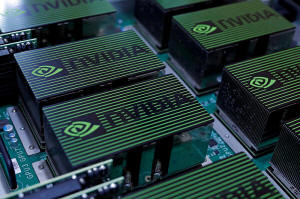|
The
French so-called statement of objections or charge sheet would
follow dawn raids in the graphics cards sector in September last
year, which sources said targeted Nvidia. The raids were the
result of a broader inquiry into cloud computing.
The world's largest maker of chips used both for artificial
intelligence and for computer graphics has seen demand for its
chips jump following the release of the generative AI
application ChatGPT, triggering regulatory scrutiny on both
sides of the Atlantic.
The French authority, which publishes some but not all its
statements of objections to companies, and Nvidia declined
comment. The company in a regulatory filing last year said
regulators in the European Union, China and France had asked for
information on its graphic cards.
The European Commission is unlikely to expand its preliminary
review for now, since the French authority is looking into
Nvidia, other people with direct knowledge of the matter said.
The French watchdog in a report issued last Friday on
competition in generative AI cited the risk of abuse by chip
providers.
It voiced concerns regarding the sector's dependence on Nvidia's
CUDA chip programming software, the only system that is 100%
compatible with the GPUs that have become essential for
accelerated computing.
It also cited unease about Nvidia’s recent investments in
AI-focused cloud service providers such as CoreWeave.
Companies risk fines of as much as 10% of their global annual
turnover for breaching French antitrust rules, although they can
also provide concessions to stave off penalties.
The U.S. Department of Justice is taking the lead in
investigating Nvidia as it divvies up Big Tech scrutiny with the
Federal Trade Commission, a source familiar with the matter has
told Reuters.
(Reporting by Foo Yun Chee; Editing by Jan Harvey and David
Holmes)
[© 2024 Thomson Reuters. All rights
reserved.]
This material may not be published,
broadcast, rewritten or redistributed.
Thompson Reuters is solely responsible for this content.

|
|




